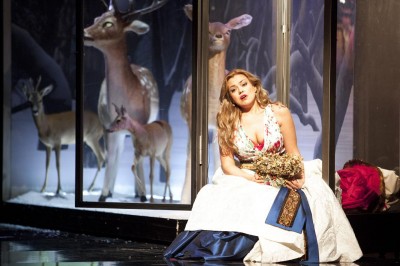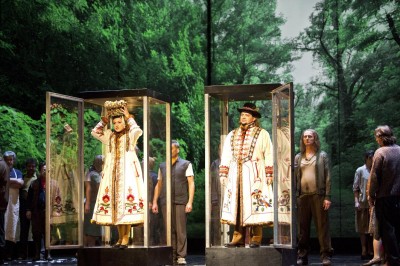Bartered Bride at Staatsoper in Berlin
By Bruno Tredicine on 5/17/12 • Categorized as Opera
BARTERED BRIDE IN BERLIN.
Review by Bruno Tredicine
BERLIN: The Bartered Bride is the second opera written by Bedrich Smetana, and undoubtely his most famous, or better: the only really popular among his works, and this against his own desire. His other operas were more important to him, as he stated clearly when he said: “Those who think that I’m happy when they flatter me because of The Bartered wife are completely wrong; they simply show that they didn’t understand nothing of my other most important operas”. But nothing could be done: the tender love story on the typical background of a bohemian village, became and still is, czech’s national opera.
Smetana wrote it as a challenge: after the success of his “Brandenburgers in Bohemia” he was considered a Wagnerian, too much influenced by foreign musical languages, and the director of ‘Provisional theatre’ in Prague, Hans Rieger, asked with skepticism if he could be able to write a score tied to the popular themes and music. Smetana proudly decided to try and with a libretto by Karel Sabina (author of Brandeburgers), Prodana Nevesta was born.
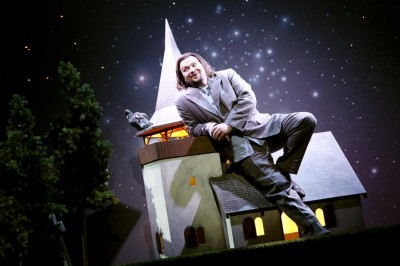
The opera was not a success at once: the first performances were not successful, and Smetana had to arrange the score three times before it was acclaimed; the international glory came with Vienna performance in 1892 after the composer’s death, and in New York’s Metropolitan its prèmiere was conducted by no less than Gustav Mahler.
In Germany there is an old tradition of performing the opera in the local language. This tradition must be very strong if still today, when the absolute respect of the original language is a must, for its new production which started last November, Berlin’s Staatsoper has decided to put on scene Die Verkaufte Braut, that is Prodana Nevesta – or the Bartered Bride performed in german.
Although Kurt Homolka’s translation (from 1958) keeps as much as possible the original spirit of the opera, there’s no question that it can’t be compared to the spirit of the original Czech, and it has been a wise choice from Staatsoper to use the original names for the two protagonists, Mařenka e Jeník instead to the the usual Hans and Maria.
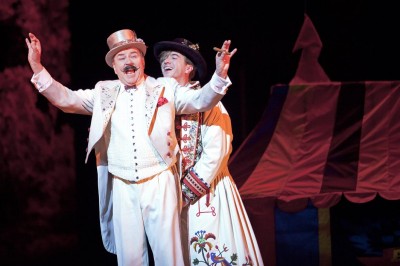 Apart that, we have seen a beautiful staging: director was Hungarian Balász Kovalik who has been in the whole respectful to the original plot (except for the finale, as we will see) and has not altered the spirit of the various characters. What he has done, he has wiped off all the comic, so that also the funny characters (Kecal, Vašek) were ‘normal’ people just like the others, with an added touch of melancholy (specially Vašek) in their spirit.
Apart that, we have seen a beautiful staging: director was Hungarian Balász Kovalik who has been in the whole respectful to the original plot (except for the finale, as we will see) and has not altered the spirit of the various characters. What he has done, he has wiped off all the comic, so that also the funny characters (Kecal, Vašek) were ‘normal’ people just like the others, with an added touch of melancholy (specially Vašek) in their spirit.
Already from the beginning the staging brings us in the right mood: all along the ouverture the curtain, is kept open high just something more than one meter from the floor, so we can see people on stage down from the chest, a young man in blue jeans which moves and interacts with the others, some of which are in folkloristic costumes, some are occupied in everyday activities like cutting a piece of wood, the most dancing and so on, in a nice scene communicating a frenetic mood.
Then, strong point of the staging is the use of big glass boxes brought on the scene, where the different places of the action are reproduced in miniature. So it is kept far from realism and from being too sentimental but at the same time it creates a poetic, almost childish world, impression increased by the delicate light design by Olav Freese very effective specially in the night scenes.
As said, the finale is somewhat original: instead of the expected happy ending, when the plot should be solved in joy, Vašek choses to go in his glass box and closes himself, starting to draw childish images on the transparent walls, revealing his true nature of never grown up boy. Mařenka looks puzzled at him and to Jeník who after a listless blessing from his father, lays unexpressively on the floor.
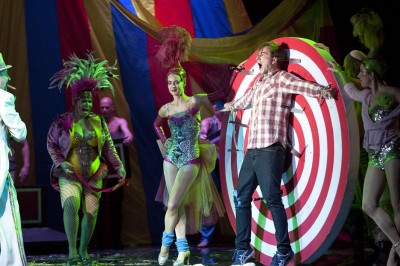
EIN ZIRKUSDIREKTOR Reiner Goldberg, ESMERALDA Adriane Queiroz, VAŠEK Florian Hoffmann. Photo: Bernd Uhlig
This ending is actually troubling and effective from a theatrical point of view: if it is also coherent with the general mood of the Bartered Bride, as it should be – well, this is something to be discussed!
Kovalik has been weak in organizing the crowd on stage, and of the three dance numbers, only the Skočna has been well staged, with a shabby Circus company coming out from a mini-top, in an hyronic demonstration of their, so to say, ‘art’. The other two, both Polka at final act 1 and famous Furiant were almost inapparent, with three dancing pairs (polka) lost in the crowd of the fair, or a changing of scene.
Anna Samuil has been an excellent Mařenka. Her voice lacks maybe in softness, sounding somewhat sharp, but her excellent technique allows her beautiful vocal effects, not only as a mere exhibition but always increasing the expressivity. Her phrasing is very accurate and she stresses the right accents creating a tender but strong charactered Mařenka.
Jeffrey Dowde has also the right stage presence for Jeník, together with the right timbre: those of a lyric but at the same time passionate tenor
. It’s a pity that sometimes, specially in the high tones, he loses the sustain so that his singing sounds not that firm anymore
.
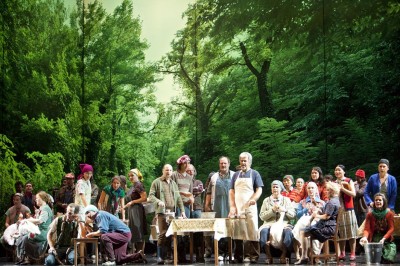
Staatsoper Berlin DIE VERKAUFTE BRAUT. Photo: Bernd UhligMICHA Andreas Bauer, VAŠEK Florian Hoffmann. Staatsoper Berlin DIE VERKAUFTE BRAUT. Photo: Bernd Uhlig
Florian Hoffmann has called attention on himself with his tender Vašek, not a funny boy as it was the use, but almost a melancholic dropout. Hoffmann has been excellent agreeing to the staging project, and also his singing has been fully to appreciate thanks to his soft homogenous tenor
.
With his huge baritone, Pavlo Hunka has been vocally outstanding as Kacel, having cut off all the comic from his role, he looked both in aspect and acting more like a state bureaucrat than a funny matchmaker.
Reiner Goldberg has been an impetuous Circus master and Adriane Queiroz a warm and hironically sexy Esmeralda.
The two parents’ couples were well sorted: if Katharina Kammerloher let us hear some effort in her singing, Oskar Hillebrandt was pointless as well as Andreas Bauer who, together with Daniela Denschlag formed the (maybe too dark depicted) couple of Michas, Vašek and Jeník father and mother.
Just from the beginning, with the famous ouverture, Karl-Heinz Steffen’s conducting lacked in character, wit, vivacity and those thousands musical coulours and dynamics that are essential elements of the score. Going on into the opera, this impression has been unfortunately confirmed: we have heard a mere accompaniment to the voices on stage, but nothing more, moreover the many orchestral section were not always well harmonized, sounding sometimes af each played for himself.
Staatsoperchor under Eberhard Friedrich has done a good job in musical precision lacking somehow in
expressivity, also for director’s responsibility, who has almost always kept them all standing still even in the most
lively moments.
For the second year, Staatsoper’s season is held in Schiller Theater, allowing renewal works in main house on
Unter den Linden
. So it’s just a couple of kilometers away from its historic ‘rival’, Deutsche Oper. Schiller Theater was built at the beginning of XX Century, then rebuilt after being destroyed by bombings in World War II. Once the largest theater in Berlin, it appears now as a very nice 1950s style architecture, with an imposant glass windows in the foyer. The acustic is very good and the audience that filled the house has tributed to the artists warm applause with no special enthusiasm.
Cast: 26/4/2012
Staatskapelle Berlin, Staatsopernchor
Chorleader: EBERHARD FRIEDRICH. Musikalische Leitung: KARL-HEINZ STEFFENS
Inszenierung: BALÁZS KOVALIK
Bühnenbild: CSABA ANTAL
Kostüme: BETTINA WALTER
Licht: OLAF FREESE
Krušna: OSKAR HILLEBRANDT
Ludmila: KATHARINA KAMMERLOHER
Mařenka: ANNA SAMUIL
Micha: ANDREAS BAUER
Háta: DANIELA DENSCHLAG
Vašek: FLORIAN HOFFMANN
Jeník: JEFFREY DOWD
Kecal: PAVLO HUNKA
Ein Zirkusdirektor: REINER GOLDBERG
Esmeralda: ADRIANE QUEIROZ
Muff: ALIN ANCA

